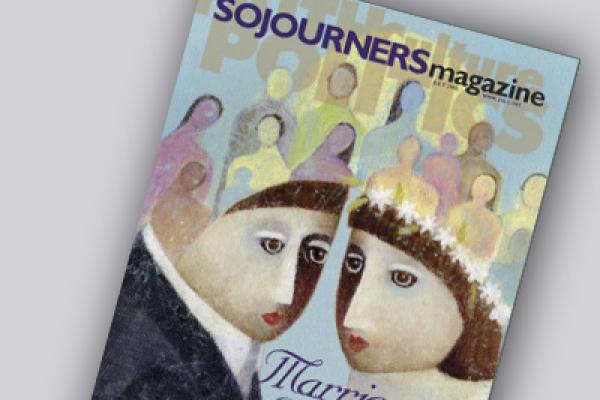On a Saturday afternoon in early January, about 200 people gathered in the center of Jiñocuao, a rural village in northern Nicaragua. Among the signs of celebration - multicolored balloons hanging from a large mango tree, children in their Sunday best - a small group of leaders from the local Christian base community gathered around a table.
In front of an attentive crowd, the community leaders, a lawyer from a nearby city, and Philip Wheaton, an Episcopal priest from Washington, D.C., signed a series of documents. The crowd erupted in applause.
With those documents, Jiñocuao’s 33-year-old Christian base community also became a nonprofit organization, "Road toDamasc" - another group had already taken the name Road to Damascus - led by men and women from the community. And the deed to about two-and-a-half acres of land in the center of town, purchased by Wheaton for $900 six years ago, was legally transferred to the base community’s organization.
Community cofounder Cándida Aguilera expressed her jubilation as Wheaton handed over the ceremonial keys to the communal buildings. "Now we have the keys to the property that is ours," she said. Since its formation, the base community has survived war, loss of family members to the CIA-supported contras, natural disaster, and marginalization by the institutional church - and the economic struggles common to many in rural Nicaragua.
Road to Damasc now strives to find creative ways to survive economically. They have set up cooperatives - including a bakery, a carpentry shop, and women’s pig and chicken husbandry - all of which, along with the community land on which many of the projects are built, will now be managed by the nonprofit organization.
The cooperative projects that the people of Jiñocuao have been able to undertake are the result of the leadership of the Christian base community, said Wheaton, who has been a friend and assistant pastor to the community for 14 years. "It was the faith community that held the [larger] community together."
Those who live in Jiñocuao - named for the jiñocuabo tree, known for its healing properties - have found continued reasons to work together, both in their faith community and in social development projects such as the cooperatives. "Their goal is to emulate the small communities established by Jesus Christ,’’ according to Wheaton. They are like the poor in Galilee to whom Jesus ministered, he said.
JIÑOCUAO’S BASE COMMUNITY, originally named San José Church, was established in 1972, in the context of a growing liberation theology movement that focused on the role of the poor in scripture and church life. The movement blossomed when, following Vatican II in the mid-1960s, Latin American bishops gathered in Medellín, Colombia, and developed "the preferential option for the poor," a stance of advocating for the poor in social struggles.
At the time, many small churches began to form base communities, which interpret scripture through the eyes of the oppressed and have a less hierarchical structure than most Roman Catholic churches. Priests formed partnerships with base communities, visiting them every year or two to perform baptisms and administer communion and other sacraments. In the 1960s and ’70s, base communities in Latin America "mushroomed all over and became what we call the church of the poor,’’ said Wheaton.
The San José Church was formed by six women, including Aguilera, and one man - Valentín Ponce, who was trained as a delegate of the word - a lay pastor. The delegates can speak about scripture and lead church services, but cannot give sacraments like communion.
But in the 1980s and 1990s, the Catholic Church discouraged the liberation theology movement. "The church has squandered a tremendous opportunity by fearing the delegates would take power from the priests," according to Wheaton. "It’s the greatest error and failing that the Catholic Church has made in a long time."
In 1985, a priest from the nearby town of Somotillo visited the San José Church and accused the delegates of the word of being unauthorized by the diocese, without the proper identification cards. Cándida Aguilera stood and called out, "When Christ ordered the disciples to preach the Word, he didn’t say they had to carry a card," she later recalled.
The priest stormed out. The church was abandoned, all but excommunicated. About that time, some of the delegates of the word from the church began to have a relationship with Uriel Molina, a former Franciscan priest who was expelled from his order for his support of the Sandinistas. Molina became acting pastor of the San José Church in 1999. The base community of San José in Jiñocuao is no longer part of the official Catholic Church, but most members still see themselves as Catholics.
Though Molina is pastor, the San José church has many leaders, including six delegates of the word and young people who participate in church services and activities. Jiñocuao can boast of having one of the few - if not the first - female delegates of the word among base communities in the area. At a recent Saturday Mass, a young mother led the service. Members of the youth group read the Bible lessons, and Ponce opened a "dialogue" for the congregation to reflect on the readings.
THE COMMUNITY PROJECTS are also led by a variety of people of all ages and coordinated in part by the Road to Damasc commission, which uses democratic processes.
Though the community had attempted some projects in the 1990s - a vegetable garden and organic fertilizer production - their efforts were intensified after the devastation of Hurricane Mitch in November 1998. The Rio Gallo, which runs through the village, rose 32 feet during four nights of heavy rain. Though no lives were lost, 15 homes were completely destroyed, according to locals.
"Mitch was like an end-time experience," Wheaton said, recalling the stories of community members. It became a turning point.
Support from religious, humanitarian, and development organizations came to the village. People came together in force to begin rebuilding houses. Then women suggested starting pig and chicken cooperatives. The cooperatives continue to function, with good years and bad years financially, led by 31 local women, including dressmakers, teachers, and mothers.
Now, a bakery produces fresh bread and pastries every morning. A dressmaking shop tailors dresses for special occasions. A carpentry shop makes mahogany and laurel chairs and beds. A natural medicine cooperative provides remedies for illness using mostly local plants.
"Jiñocuao is tremendous because they’ve done this on their own,’’ Wheaton said.
Though the youth group and community projects set Jiñocuao apart from many other towns in the area, their struggles are the same as other Nicaraguans’ in substantial ways. Most families in Jiñocuao survive by farming. The three main crops in northwest Nicaragua’s arid mountains are corn, beans, and sesame.
Sesame is the cash crop, but there are few buyers now, said Jorge Carasco, a small farmer in Jiñocuao. "Our work doesn’t pay," said Carasco while watching his crop being weighed and bought by a Honduran woman who had come across the border to buy sesame.
In addition to the uncertainties of farming, Jiñocuao faces some challenges in their religious life and its connection to the liberation theology movement.
The future of the Christian base communities "is a huge question mark," according to Wheaton. "It has been devastated in many parts of Latin America," he said, but "it has sustained itself in many places." Despite criticism of liberation theology by some Catholic officials, two or three dozen base communities in Nicaragua still practice in some way.
SPEAKING AT HIS home in Managua in January, where he is struggling with cancer, Uriel Molina said the community took "a great step forward" with establishing the nonprofit organization and receiving the communal land. "This represents a maturity." Wheaton had purchased the land in 1999 to protect it for the community’s use, because people in Jiñocuao - like those in many small villages - didn’t hold legal titles to their land, only letters of ownership that did not provide adequate protection.
Many members of the community of Jiñocuao look to the projects and the church to find hope. Speaking to the assembled community members in January as they celebrated the legal transfer of the land, Pascual Rios - a delegate of the word, co-leader of the youth group, and member of the board of directors of the not-for-profit organization - said, "We’re going to develop this organization to move our community forward."
Valentín Ponce, the new president of Road to Damasc, reminded the gathered group that though they have come far, their journey as a Christian community is not over: "Brothers, sisters, this struggle will continue."
Katherine S. Paarlberg, a Sojourners organizer, and Celeste Kennel-Shank, a freelance reporter, traveled to Jiñocuao with Philip Wheaton in January. Wheaton published a book this spring about Jiñocuao, Faithful Community, in English and Spanish versions.

Got something to say about what you're reading? We value your feedback!
